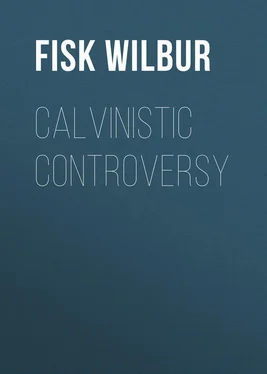Wilbur Fisk - Calvinistic Controversy
Здесь есть возможность читать онлайн «Wilbur Fisk - Calvinistic Controversy» — ознакомительный отрывок электронной книги совершенно бесплатно, а после прочтения отрывка купить полную версию. В некоторых случаях можно слушать аудио, скачать через торрент в формате fb2 и присутствует краткое содержание. Жанр: foreign_antique, foreign_prose, на английском языке. Описание произведения, (предисловие) а так же отзывы посетителей доступны на портале библиотеки ЛибКат.
- Название:Calvinistic Controversy
- Автор:
- Жанр:
- Год:неизвестен
- ISBN:нет данных
- Рейтинг книги:4 / 5. Голосов: 1
-
Избранное:Добавить в избранное
- Отзывы:
-
Ваша оценка:
- 80
- 1
- 2
- 3
- 4
- 5
Calvinistic Controversy: краткое содержание, описание и аннотация
Предлагаем к чтению аннотацию, описание, краткое содержание или предисловие (зависит от того, что написал сам автор книги «Calvinistic Controversy»). Если вы не нашли необходимую информацию о книге — напишите в комментариях, мы постараемся отыскать её.
Calvinistic Controversy — читать онлайн ознакомительный отрывок
Ниже представлен текст книги, разбитый по страницам. Система сохранения места последней прочитанной страницы, позволяет с удобством читать онлайн бесплатно книгу «Calvinistic Controversy», без необходимости каждый раз заново искать на чём Вы остановились. Поставьте закладку, и сможете в любой момент перейти на страницу, на которой закончили чтение.
Интервал:
Закладка:
But the use of these terms by those who believe as I understand the reviewer to believe, is the more unjustifiable, because they are used by most Calvinistic authors in a different sense. – Why, then, should the reviewer, believing as he does, continue to use them in the symbols of his faith? Different persons might give different answers to such a question. For one, I would prefer he should answer it himself.
I cannot approve of the reviewer’s censures upon my manner of treating the doctrine of predestination. He accuses me of confounding the doctrine itself, with modes of explanation. He says they are perfectly distinct; and though some may have been unfortunate in their modes of explanation, and though he acknowledges my arguments bear against such, yet the fact of the doctrine itself is not thereby affected. His mode of explanation, for example, he thinks untouched by the arguments of the sermon. But his mode of explanation, as we have seen, turns the doctrine into Arminianism . And it would, perhaps, be no difficult matter to show, that any explanation of the doctrine, short of doing it away, would be exposed to all the weight of the arguments urged in the sermon. But the sermon was never written to oppose those who hold to the decrees of God in an Arminian sense. Why then does the reviewer complain of the sermon? Why does he so “deeply regret” that the author of the sermon “should come before the public with an attack on the faith of a large part of the Christian community, conducted in a way so obviously erroneous and unjust?” The sermon was against Calvinism, not Arminianism. It is true, the reviewer may say, the sermon alludes, in some parts, to the Calvinism of New-England, and therefore he felt himself implicated. But he certainly was not unless he is a New-England Calvinist – unless he believes that “God foreordains whatsoever comes to pass,” in the proper sense of those terms. Indeed, it seems that Calvinism, in its proper character, is as obnoxious to the reviewer, as to the author of the sermon; and the former seems to have taken this opportunity to show the nakedness of the system, and bring into notice a better doctrine. If so, is it safe that the reviewer should still accord to them their old symbols of faith? And is it just, that the author of the sermon should be held the defendant on the record, when the execution is issued against Calvinism itself? In answer to the former question, I would say, it is utterly unsafe , and never will be approved of, I believe, by Arminians. With respect to the latter question, if it is safer to attack Calvinism in this indirect way, I will not object, though it may seem at present to my disadvantage. But I cannot see that it would be safer – an open bold front always ends best. What if it should subject the reviewer, and the theological doctors in New-Haven generally, to the charge of heresy? Still they ought not to shrink from their responsibilities – they occupy a commanding influence among the Churches and over the candidates of their theological school, and that influence should be openly and decidedly directed to discountenance error. They should remove it, root and branch. Especially should they discard those old symbols of faith, which are not only in themselves, in their true and proper meaning , a reflection upon the clerical character, and a black spot upon an otherwise orthodox creed, but are also especially obnoxious, because they are the very articles which the great body of the Calvinists have maintained, in a sense widely different from that of the reviewer. At the head of these stands Calvin, the author of the system, in the Protestant Church. Calvin, who says, “I will not scruple to own that the will of God lays a necessity on all things, and that every thing he wills necessarily comes to pass.” “Adam fell, not only by the permission , but also by the appointment of God. He not only foresaw that Adam would fall, but also ordained that he should.” “The devil and wicked men are so held in on every side, with the hand of God, that they cannot conceive or contrive or execute any mischief, any farther than God himself doth not permit only, but command – nor are they held in fetters, but compelled also, as with a bridle, to perform obedience to those commands.” Calvin, it seems, was far from thinking that appointment only meant permission , or that to ordain only meant certainty foreseen . In this he was correct: in this he has been followed by a host of writers down to the present day, and copied in numerous ecclesiastical symbols, in different parts of Christendom; and does not the reviewer know that these terms are understood by Hopkins and Emmons, and all the Calvinists of that school, in a sense widely different from his explanation, and in a sense, too, much more in accordance with the proper meaning of the terms? Does he not know that a great majority of the Calvinists of the United States, and perhaps in New-England, even understand these terms, as indeed they ought to be understood, when used in reference to sin, as expressing a preference of sin, in that part of the Divine plan where sin occurs, to holiness in its stead? Indeed, as I understand the reviewer, from the days of John Calvin down to the present hour, there is, on this point, between the great body of Calvinists and himself, almost no likeness, except in the use of words. Theirs is one doctrine – his another. Why, then, does he oppose the opposers of Calvinism, and thus keep error in countenance? Especially, why does he hail from that party, and hoist their signals, and then, alter seeming to get the victory, by espousing the very cause of the assailed, encourage the Calvinists to triumph, as if their cause had been successful? Is this justice to the author of the sermon? Is it the best way to promote truth? But I forbear. The reviewer’s subsequent explanations may remove these difficulties. At any rate, the cause of truth will doubtless advance. The appearance of this review has given additional strength to the sentiment, Calvinism “is waxing old, and is ready to vanish away.” The dogma that “God has predetermined all events, and elected (in a Calvinistic sense) out of our guilty world all who shall be heirs of salvation,” withers at the touch of advancing truth, and is fast losing credit in the Christian Church.
Since writing the above, I have seen an inquiry of a correspondent in one of the Calvinistic papers, in these words, “Why do our Calvinistic writers retain the words which seem so sadly to perplex our Arminian brethren, when it is certain that we do not attach the signification to them which they always pretend?” and then instances in the word “foreordain.” The editor, in reply, gives as a reason for using these words, that they are Scriptural; and seems to deem it necessary that they should persist in this use until we submit. This reply of the editor reminded me of a remark of Mr. Tyler, in his sermon already alluded to: “The Calvinist contends that God resolved, from eternity, to permit all the sins and miseries which were to take place; and this he calls, in the language of the Bible, foreordination .” Now, not to stop here, to show that no true Calvinist would ever call foreordination and permission the same thing, for Calvin has, as we have seen, clearly distinguished the two words from each other, I beg the privilege of adding a thought or two on this idea of Scripture authority for the use or these terms. For if it is only because the Scriptures use these words in this sense, that they persist in using them, I think we may easily settle this question. Let it be shown that the Scriptures use “foreordination,” or “predestination,” in the sense of mere permission – not absolutely hindering . Again: let one passage be shown in which it is said, God “predestinates” all things, or “foreordains” whatsoever comes to pass. If this cannot be done, how futile, how more than absurd is it, to talk about using these words, because the Scriptures use them! To use Scripture words out of the Scripture sense, and then appeal to Scripture to sanction this use, is as sad a perversion of the Scriptures as it is of logic. Indeed, to give such a meaning to the word predestinate, is at once to take away the principal scriptures quoted by the reviewer, and others, to prove Calvinistic election. See Eph. i, 5; ii, 10; Rom. viii, 29. Does predestination in these passages mean merely to permit , or not to hinder? and do these passages teach a personal election to eternal life? Is this all the Calvinists mean by the election of sovereign grace , not of man, nor of the will of mans but of God? Alas! for the elect! If man does not elect himself, and God only predestinates , that is, permits – does not hinder his election; who, we ask, will elect him? How does error destroy itself! These gentlemen may take which ground they please; they may either acknowledge that Bible predestination means an efficient purpose of God to accomplish an object, and then meet the sermon on the issue there proposed; or they may interpret these words as the reviewer has, and then give up those passages which they consider their strong hold, in favour of Calvinian election. In either case their system must suffer serious loss. Nothing could be more unfortunate, I think, than this appeal to the Bible to sanction such an abuse of terms. As to the word foreordain, I do not recollect that it occurs in our translation. Jude 4, has “before of old ordained,” &c, but it is in the original very different from the word rendered predestinate. The allusion is to characters that were proscribed for their sins, and designated for deserved punishment. The original for predestinate, proorizo, is used in only one place, so far as I can find, with any direct reference to a sinful act, Acts iv, 28. This passage is quoted by the reviewer. But the determination here spoken of, he himself informs us, relates to “the purpose of God to make an atonement for the sin of the world, by means of the death of Jesus Christ.” Hence the predetermination of God, in this instance, probably refers to the work of atonement, without including therein any special decree in respect to the means of the suffering. Christ could have suffered, even unto death, in the garden without any human means. But inasmuch as these men had the murderous purpose, God “chose to leave Christ to their power,” &c, therefore decreed
Читать дальшеИнтервал:
Закладка:
Похожие книги на «Calvinistic Controversy»
Представляем Вашему вниманию похожие книги на «Calvinistic Controversy» списком для выбора. Мы отобрали схожую по названию и смыслу литературу в надежде предоставить читателям больше вариантов отыскать новые, интересные, ещё непрочитанные произведения.
Обсуждение, отзывы о книге «Calvinistic Controversy» и просто собственные мнения читателей. Оставьте ваши комментарии, напишите, что Вы думаете о произведении, его смысле или главных героях. Укажите что конкретно понравилось, а что нет, и почему Вы так считаете.












